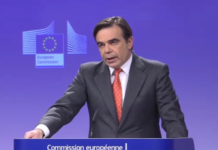The budget plan that has been proposed by President Trump 4 days ago, (15th March 2017) calls for a $100 million cut in funding of programs that are involved in climate change.
Director Mick Mulvaney who heads the Office of Management and Budget, said during a press conference: “We’re not spending money on that anymore” because he said federal climate change programs are a “waste of your [tax] money.”
David Waskow, who is the Director of the International Climate Initiative at Washington DC research group World Resources Institute, told The Independent that investing in combating climate change is “in the US economic and security interests.” “If we don’t take serious action on climate change, it’ll cost us far more money to deal with severe weather events, rising sea levels, and security risks from displacement and resource scarcity,” explained Mr. Waskow.
At the National Oceanic and Atmospheric Administration, $250 million in coastal and ocean grants and programs — many of which help ready communities for rising seas and a warmer, more acidic ocean — would be cut. Satellite programs would be trimmed. The proposed cuts, previously reported on by The Washington Post, have shaken the country’s climate science community and triggered an outcry. At NASA, research in world sciences would take a hit, and several research programs aimed at gathering information about climate change would be eliminated.
The budget also targets climate change regulations as well as their associated support structure. At the Environmental Protection Agency, the budget proposal cuts into much of the agency’s work on climate change and the environment. It would also aim at discontinuing funding for the Clean Power Plan, which was the Obama administration’s signature effort to combat climate change. Through the reduction of carbon dioxide emissions from power plants. It also plans to wipe out funds for international climate change programs, as well as for climate change research and partnership programs.
Mr. Trump’s proposed budget plan effect has also been felt by the international community. Recently, during a G20 summit in a Germany resort Baden-Baden the Financial officials from the world’s biggest economies were forced to drop from a joint statement any mention of financing action on climate change, reportedly following pressure from the US and Saudi Arabia.
The change in direction regarding Climate change has an adverse effect in America’s relation with other countries in particular China. The signing of the climate agreement with China in November 2015, which happened ahead of the global Paris Agreement on Climate Change, played a part in “easing relations” with the country, Time reports. Their communication had no mention of a commitment to fund action on climate change, and Reuters reported there was opposition from the US, Saudi Arabia, and other countries to Germany’s intention to include it. “Climate change is out for the time being,” an official told the agency. It did, however, say: “We reaffirm our commitment to rationalize and phase out, over the medium-term, inefficient fossil fuel subsidies that encourage wasteful consumption, recognizing the need to support the poor.




